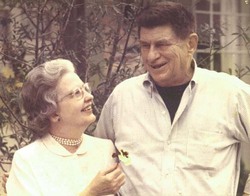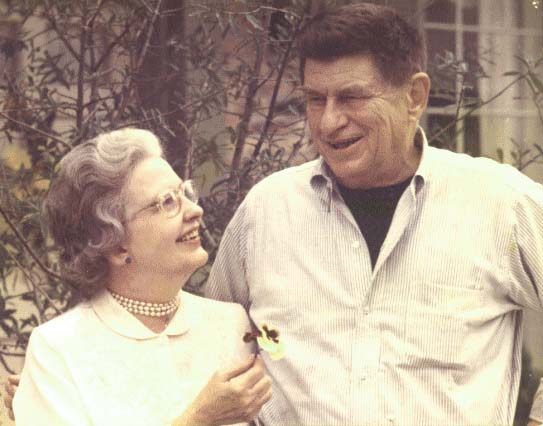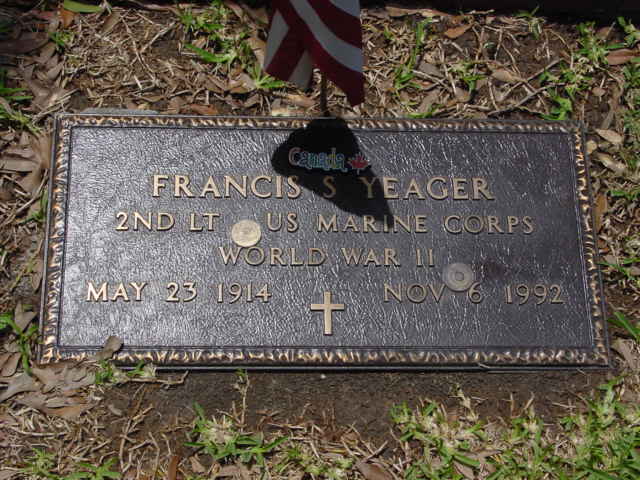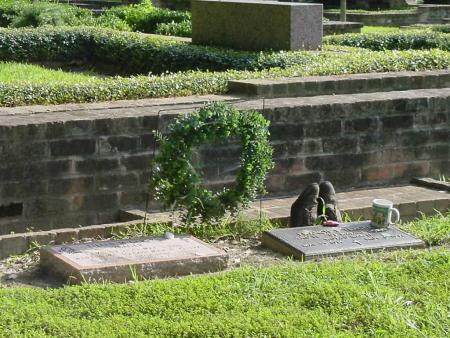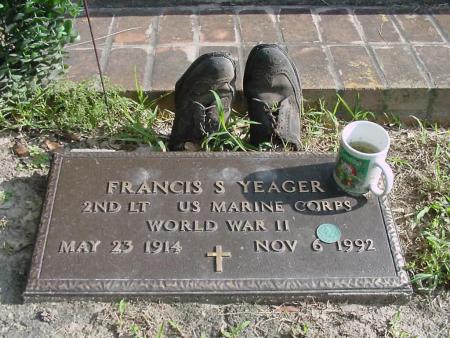Francis was an economist, a philosopher, a piano-player, an ex-seminarian, an ex-Marine and a staunch friend and adviser to hundreds and hundreds of men and women. His mother, Mollie Harrop Yeager, was shocked and appalled that he chose to enlist in the ranks instead of becoming an officer, but he rose through the ranks to a field promotion on Okinawa in the Pacific. He spent most of his time in the service as a Sergeant, a good proportion of that as a Master Sergeant (2nd Marine Aircraft Wing.) The only lullaby he could ever sing his children was the "Marine Hymn," so we sang it over his grave when we buried him.
He was large, blunt, direct, short-tempered, affectionate, sentimental, never loquacious but often eloquent; and frequently under questioning was maddeningly taciturn. He never told structured jokes but had a genuine, working spontaneous wit. His insight was that the funniest statements are the unexpectedly truest. He was a gifted teacher, able to convey the complexity of economics into several generations of hard-headed Texans.
He learned his Aristotelian and Thomistic philosophy from the Basilian Fathers at St. Thomas High School in Houston and Assumption College, Windsor, Ontario. He joined the seminary after high school and did his student teaching in Basilian high schools, but left the order cleanly and amicably in 1939 prior to receiving final vows. His good friend and one-time teacher Father Edward Gregory Lee, CSB, said of him that he was "a temperamentally conservative man who became a liberal by dint of sheer intellect." He was a big supporter of Sen. Gene McCarthy in 1968 and was selected as a Jesse Jackson delegate to the State Democratic Convention in 1988.
After the war he couldn't quite decide whether to use his GI Bill educational benefits to go to the Julliard School of Music in New York City to study piano, or to a university in the Midwest to study economics in the "institutional economics" mold of Thorstein Veblen, inventor of the concept of "conspicuous consumption." He chose economics because he thought it would give him a better chance of supporting a wife and a family.
Between 1947 and 1950 while living in one-half of a Quonset hut on the grounds of the University of Minnesota in Minneapolis, he acquired a wife, three children, an MA, and a PhD. After he graduated, he moved his young family to Houston, where he had grown up and where his youngest three children were to be born. His wife, Eileen McCarty Yeager, had grown up in a small Iowa town and told him she was worried about moving to the big city. To limit their universe somewhat, he said, "Don't worry, Eileen; there are only six parishes in Houston, and we know everyone in them."
After practicing as a private economist on contract to the oil industry, he taught at the University of St. Thomas and then at the University of Houston until his retirement. Once he retired, he threw himself into the anonymous fellowship his wife had prayed him into from Al-Anon in 1959. His best joke was, "If I'd known I was going to stay sober this long, I'd have tried to work the Twelve Steps better."
In line of direct descent, Francis left six children, seven grandchildren, a host of nieces and nephews, an enormous number of economics students in 38 years of teaching, and innumerable sponsees in 33 years of sobriety. It is the anonymous one-inch circular anniversary "chips" of the latter that adorn his grave maker (looking like large spots of rain in the adjacent photograph.) To this day people who knew him come out to his grave and leave new "chips" as a reminder of his help in their reaching another year of useful sober life
Francis was an economist, a philosopher, a piano-player, an ex-seminarian, an ex-Marine and a staunch friend and adviser to hundreds and hundreds of men and women. His mother, Mollie Harrop Yeager, was shocked and appalled that he chose to enlist in the ranks instead of becoming an officer, but he rose through the ranks to a field promotion on Okinawa in the Pacific. He spent most of his time in the service as a Sergeant, a good proportion of that as a Master Sergeant (2nd Marine Aircraft Wing.) The only lullaby he could ever sing his children was the "Marine Hymn," so we sang it over his grave when we buried him.
He was large, blunt, direct, short-tempered, affectionate, sentimental, never loquacious but often eloquent; and frequently under questioning was maddeningly taciturn. He never told structured jokes but had a genuine, working spontaneous wit. His insight was that the funniest statements are the unexpectedly truest. He was a gifted teacher, able to convey the complexity of economics into several generations of hard-headed Texans.
He learned his Aristotelian and Thomistic philosophy from the Basilian Fathers at St. Thomas High School in Houston and Assumption College, Windsor, Ontario. He joined the seminary after high school and did his student teaching in Basilian high schools, but left the order cleanly and amicably in 1939 prior to receiving final vows. His good friend and one-time teacher Father Edward Gregory Lee, CSB, said of him that he was "a temperamentally conservative man who became a liberal by dint of sheer intellect." He was a big supporter of Sen. Gene McCarthy in 1968 and was selected as a Jesse Jackson delegate to the State Democratic Convention in 1988.
After the war he couldn't quite decide whether to use his GI Bill educational benefits to go to the Julliard School of Music in New York City to study piano, or to a university in the Midwest to study economics in the "institutional economics" mold of Thorstein Veblen, inventor of the concept of "conspicuous consumption." He chose economics because he thought it would give him a better chance of supporting a wife and a family.
Between 1947 and 1950 while living in one-half of a Quonset hut on the grounds of the University of Minnesota in Minneapolis, he acquired a wife, three children, an MA, and a PhD. After he graduated, he moved his young family to Houston, where he had grown up and where his youngest three children were to be born. His wife, Eileen McCarty Yeager, had grown up in a small Iowa town and told him she was worried about moving to the big city. To limit their universe somewhat, he said, "Don't worry, Eileen; there are only six parishes in Houston, and we know everyone in them."
After practicing as a private economist on contract to the oil industry, he taught at the University of St. Thomas and then at the University of Houston until his retirement. Once he retired, he threw himself into the anonymous fellowship his wife had prayed him into from Al-Anon in 1959. His best joke was, "If I'd known I was going to stay sober this long, I'd have tried to work the Twelve Steps better."
In line of direct descent, Francis left six children, seven grandchildren, a host of nieces and nephews, an enormous number of economics students in 38 years of teaching, and innumerable sponsees in 33 years of sobriety. It is the anonymous one-inch circular anniversary "chips" of the latter that adorn his grave maker (looking like large spots of rain in the adjacent photograph.) To this day people who knew him come out to his grave and leave new "chips" as a reminder of his help in their reaching another year of useful sober life
Inscription
2nd LT US Marine Corps
World War II
